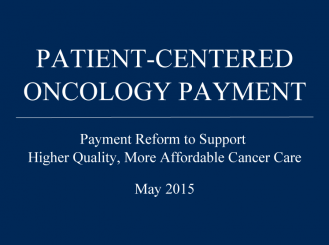Aug 26, 2015
ASCO recently released a proposal to significantly improve the quality and affordability of care for patients with cancer. Expanding on a payment model circulated last year, the ASCO proposal would fundamentally restructure the way oncologists are paid for cancer care in the United States by providing sufficient payment to support the full range of services that patients need and removing the barriers created by the current payment system to delivering high-quality, affordable care.
ASCO’s Patient-Centered Oncology Payment: Payment Reform to Support Higher Quality, More Affordable Cancer Care (PCOP) proposal is designed to simultaneously improve services to patients and reduce spending for Medicare and other payers.
According to ASCO, PCOP would meet the definition of an Alternative Payment Model as set out in legislation Congress enacted in April 2015 to repeal Medicare’s Sustainable Growth Rate formula. The Medicare Access and Children’s Health Insurance Program (CHIP) Reauthorization Act of 2015 encourages development of alternatives to the current Medicare fee-for-service payment system as a strategy to achieve higher quality, more affordable care. ASCO’s PCOP proposal would enable oncology practices to take greater accountability for key aspects of cancer care spending without harming patients and without putting practices at risk for costs they cannot control.
ASCO’s proposal addresses one of the major problems in today’s fee-forservice system: Inadequate payment for the wide range of services critical to supporting patients with cancer and managing a complex illness that often changes from day to day, including:
- Education and support to help patients make the best choices about their cancer treatment;
- Rapid response for patients experiencing problems during treatment to help avoid emergency department visits or hospitalizations;
- Care coordination with other health care providers; and
- Continued support to patients after active treatment ends.
Under PCOP, oncology practices would commit to delivering evidence-based care, ensuring patients receive the most appropriate tests and treatments while avoiding unnecessary expenses.
Development
The PCOP proposal was developed by an ASCO volunteer workgroup of leading medical oncologists from diverse practice settings, seasoned practice administrators, and experts in physician payment and business analysis. ASCO used data from the National Practice Benchmark for Oncology and interviews with a sample of oncology practices to estimate the amount of time and money oncology practices are currently spending to deliver services to patients that are not adequately supported by existing fee-for-service payments for office visits and infusions.
ASCO has estimated that, under PCOP, oncology practices would receive a significant increase in payments for patient services compared to what they receive today, yet overall spending on cancer care would decrease because patients would avoid expensive hospitalizations and unnecessary tests and treatments.
The PCOP proposal incorporates extensive input that the Society received on an earlier draft proposal, Consolidated Payments for Oncology Care: Payment Reform to Support Patient-Centered Care for Cancer, which was released in May 2014.
Find more information and the complete text version of the ASCO payment reform model.

